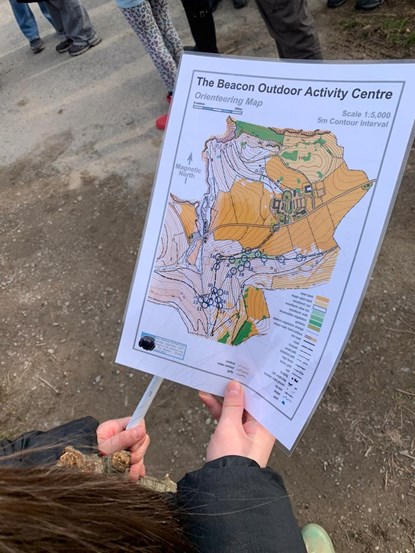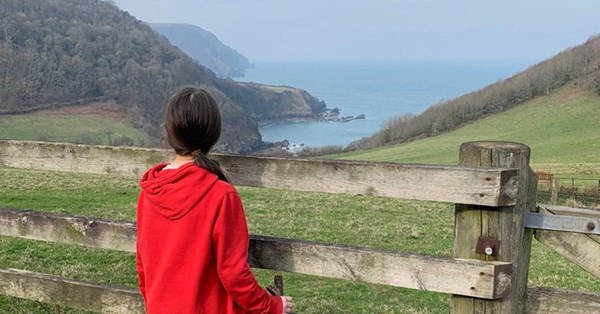WE ARE in a valley in part of the woods in Lee Abbey’s 280-acre estate, standing by a fire pit where we have used flint and steel to set light to tumble-dryer fluff. A small fire burns as we sing Matt Redman’s “10,000 Reasons (Bless the Lord)”.
My daughter Imogen is standing on a fallen tree, song sheet in hand, singing enthusiastically. I look up to the treetops and feel the familiar warmth of God’s presence, the magnificence of the forest reminding me that God is bigger than every difficult life situation.
As I look back again at the women and girls here, I feel a sense of being held by last night’s prayers from the women on this retreat, who are also negotiating the challenging journey of 21st-century motherhood.
Encouraged by verses from Psalm 71 (drawn from an envelope that we had to piece together, in mother-daughter pairs), verse 18, in particular, resonates: “Even when I am old and grey, do not forsake me, my God, till I declare your power to the next generation, your mighty acts to all who are to come.” I am reminded that there is something sacred in the mix of all that daily life throws up (the washing of school uniforms, the cooking of dinners, the constant navigation of changing emotions, alongside the telling of family stories of things that God has done).
We arrived at the estate’s bushcraft area, having orienteered our way in family pairs, with a laminated map and pen, and eight symbols to spot en route. For us, getting to a service has never been more fun.
 Christine Miles The map for Sunday’s orienteering
Christine Miles The map for Sunday’s orienteering
And the poignant moments that a retreat makes space to allow to happen continue. Immediately preceding our time of worship, we list one thing that we’ve learnt so far in our life about God; one thing we like about ourselves; and one thing that we admire about our mother or daughter.
At an age when some parents might be locked into repeated negotiations about iPads, phones, bedtimes, make-up, school, homework, pocket money, etc. (and who hasn’t been told: “I hate you!” sometimes in response?), it is good to be given time to share what we have written down.
My daughter and I experience a sometimes fractious relationship. But then Imogen pulls the rug from under me with her kindness: buying food for homeless people, giving sympathy if I’m upset, massaging her dad’s hands after a busy day’s work.
She beams when I tell her that I think she is very caring. And I will remind myself, in tougher moments, that she has written down that I am kind, caring, and pretty.
After some tricky times with going to school, I love that Imogen’s list includes a picture of a stick-man God and her, connected by a circle, which says: “Hope”. I can feel a glimmer of that, too, if she feels like that at the moment.
The retreat is open to eight- to 16-year-old daughters. We finish our worship and fire in the woods with a prayer written by one of the teenagers, before we amble back as a rough group. Imogen and I hang back to splash in the stream and, later, to admire the view of the retreat house from the path. Imogen takes pictures to ping to her sister.
A LONG drive from home to the retreat house in Lynton, Devon, means that we miss the Friday-night “ice-breaker” games and the night walk to Lee Abbey’s own private beach for a beach fire. But we arrive at the Beacon Centre, Lee Abbey’s bunk house for schools and youth groups, just in time for hot chocolate.
I can tell that Imogen is feeling awkward. But then Beckie, one of five women from Lee Abbey’s residential community hosting the weekend, offers Imogen some instant noodles (surely one of the best ice-breakers for a pre-teen), and another similar-aged girl bounces over, pool cue in hand, to ask whether Imogen wants to join in a game with her and one of Beckie’s daughters. From this point on, the trio are almost inseparable.
On Saturday morning, we are split into younger- and older-daughter groups for games. First, we play “nightline” (we wear blacked-out goggles and navigate our way round all kinds of terrain with one hand on the next person’s right shoulder, passing instructions to the person behind us). It’s fun and bonding.
Afterwards, we swap with the older girls’ group to play “cratestack”: one mother-daughter pair stacks crates against the clock, while the other pair (safety-harnessed) stand on the progressing stack, helping to build as it gets too high for the pair on the ground to reach. The heat is on to get the highest stack, while the rest of the group belay.
In the afternoon, it’s free time. Imogen and I head into Lynton for a walk around. We eat ice cream, take pictures, ride the funicular to the beach and back, and look round the arts and crafts centre. In the evening, it’s the (optional) mother’s prayer and chat time, while the daughters craft and chill.
We have dinner in the retreat-house dining room, then wander back to the Beacon Centre for hot chocolate and games. Not by design, Imogen and I sit up chatting with the older girls till 10.30 p.m. As they talk, I can see Psalm 71 in effect again: for instance, when Imogen talks about her “crush” at school, one of the girls says: “I hope he is a man of God” — something that Imogen would say was “cringe” if it had come out of my mouth.
As the Beacon Centre accommodates only one group at a time, no matter the group’s size, in between programmed activities the children and young people have total freedom to hang out in its lounge, craft in the main hall, or play pool if they wish, safely. There are also acres of outdoors that can be explored.
Imogen and I are the last to pack up and leave. Walking back to the Beacon Centre for the last time from the main house, after lunch on Sunday, Imogen gives what I consider the best review possible of our time here: “I didn’t really want to come,” she says. “But now I don’t want to leave.”
Another Mums and Daughters Creative Activity Weekend will run at the Beacon Centre in 2026, as well as a separate Dads and Lads retreat. In the summer, there are two family weeks at Lee Abbey: Meeting God in Creation (26 July-1 August) brings the family to explore together (accommodation in the house) (from £570pp); Encounter, in partnership with the Bible Society (16-22 August) runs in the Beacon, with various activities, Big Tent worship, and teaching marquees in the camp field (from £375pp).
Taking time out together
“THE aim of the Mums and Daughters Creative Activity Weekend is threefold,” a Lee Abbey community member and one of the retreat leaders, Tanya Crowder, says: “to connect with each other, with God in the outdoors, and have fun together. The time with your mother or daughter on Saturday afternoon and then the orienteering on Sunday morning is an opportunity to do something with the two of you together.”
Christian mothers-and-daughters or fathers-and-sons retreats, mixing outdoor activities with Bible teaching and worship opportunities, are common in the United States (there are also fathers-and-daughters and mothers-and-sons ones). But I had never noticed one at a UK retreat house before — though, I discover, Lee Abbey ran one before Covid.
One of the mothers, whose daughter is now 16, came before, with her daughter, then aged ten. She feels that, this time around, her daughter has benefited from having the freedom of time away without a 24/7 phone signal.
Also, as a youth and children’s worker in her own church, she says, “it’s been good for my daughter in the sense that, rather than mum organising it and her church doing it, she’s been able to be an individual in her own right.”
Spiritually, for the mother, the weekend away has provided rest that she desperately needed. “I enjoy the estate. So, if you want to just go for a walk on your own, you’re free to go for a walk, with no judgement. . . I will definitely look at Lee Abbey, in terms of a different weekend now, not necessarily with my daughter.”
CJ is the mother of one the girls who formed Imogen’s trio. As a solo parent, and a registered carer for her daughter, who has ADHD, the weekend appealed to her partly because of Lee Abbey’s setting, and partly because she felt that the retreat’s all-female focus provided “a safe place” for them to come.
“It’s quite interesting because, on the journey, as we got closer here, my daughter sang out the word ‘freedom’. And then, we went to our room, there was a poster on our wall about freedom in Christ.
“We live in a city: we don’t live in an area or street where she can go outside the home on her own, and that means she doesn’t have that sort of childhood freedom. But here she is in a space that’s set up, she can go away with other children, but still be close enough. It’s freedom and safety in a countryside setting.”
Her experience of Lee Abbey on previous occasions has been “generally positive”, she says, “but sometimes you’re a bit ‘other than’, because you are a sole parent. So, I’ve felt much more comfortable being in this environment. . . And I think we’ve been able to share really well and support each other, which has been an added bonus.
“It’s been refreshing that people were willing to share their journey, different stages . . . and that my daughter was able to play happily with two other children her age. If they are happy, as a parent it takes a load off you; but also being able to play so many different things, in such a great space.”
Youth groups at the Beacon Centre
LEE ABBEY’s Beacon Centre hosts residential weeks for schools from all over the south-west, as well as youth weekends for churches nationally.
Lee Abbey community members will create a bespoke programme for schools and youth groups, and activities can include a mix of archery, crate-stacking, climbing, zip wire, fires, and bushcraft. The centre is also open for self-catering stays.
The Beacon can accommodate up to 44 people in 15 bedrooms, with access to eight lavatories, seven showers, one bath, and two public bathrooms. There is also a disabled-access lavatory and shower.
During school holidays and at weekends, the centre is the base for Lee Abbey’s youth and children’s team, working with families booked into the main house.
















